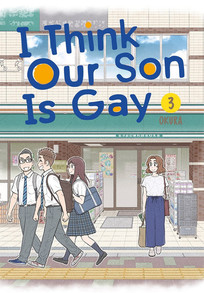Review
by Rebecca Silverman,I Think Our Son Is Gay
GN 3
| Synopsis: |  |
||
Tomoko Aoyama is pretty sure her older son Hiroki is gay, and she's starting to worry about how other people are going to treat him. When her boss comes out at work, she starts to feel a little better, but her husband's own homophobia continues to eat at her as she tries to figure out how to be the best ally possible for her child. I Think Our Son is Gay is translated by Leighann Harvey and lettered by Lor Prescott. |
|||
| Review: | |||
In volume two of Okura's gentle series I Think Our Son Is Gay, mom Tomoko is present when a man comes to pick up her boss at Steamy Bento. Immediately her coworkers begin speculating on his sexuality, and that makes Tomoko uncomfortable, because she's been suspecting for a while now that her older son, Hiroki, might be gay. The fetishistic way that a fujoshi coworker is interested in Mr. Tono's love life doesn't sit well with Tomoko, and not just because the gossip it kicks off among the other ladies at work is in poor taste. That's a plot point that comes back in this third volume in an interesting way, and while the first half of the book is largely just the same old story beats (which, admittedly, are still very good), it's Mr. Tono and Tomoko's fujoshi friend who help to move the story along. It begins when Tono simply tells the rest of the group that he's gay and that yes, the man who came to pick him up is his romantic partner. It's a wonderful moment of defusing, because the whole thing starts when another coworker “teasingly” asks if they're really just friends. Mr. Tono smiles and says that no, they aren't just friends, they're a couple, and mildly smiles through the entire ensuing conversation. The other people at the table, Tomoko included, are surprised and not entirely sure how to react. For Tomoko, that's because her only interaction with someone she thinks isn't straight is with her son, who is reluctant to say anything about his preferences. But her coworkers are embarrassed and flabbergasted that Tono simply told them (or “admitted it” in terms of how they're thinking about it), and he's taken all of the wind out of their sails by not being anything but open and normal about it. His sexuality isn't something he just goes around talking about, but it's also not something he's planning to hide – just like any other orientation. This is an important moment in the story because it shows a way for Tomoko to continue to be the most supportive mother she can. Tono's ease with the discussion (apart from what appears to be mild discomfort that his sexual orientation is even a topic) lets her know that Hiroki doesn't need to feel ashamed, and that Tono has been with his partner for over a decade is another bit of reassurance. When he tells the others that they should have just asked instead of trying to tease the information out of him, he's reminding them that there's nothing wrong with being gay, and that's something Tomoko needs to hear. She's been working it out for herself, but Tono actually saying it and being open is the validation she needs. He backs this up when she asks him how she can best support Hiroki; when he asks if she'd change her son because he likes other boys and she says no, he tells her that she's already doing everything right. This is particularly important because her husband is not exactly Mr. Supportive himself, although that's largely because his worldview is mired in the assumption that heteronormativity is the only way to be “normal.” When Tomoko mentions at dinner that Tono came out, his reaction is to say that he didn't know “fairies” really exist, a hurtful comment that cuts like a blade even if that's not his intent. He follows this up by bugging Hiroki about when he's going to get a girlfriend and teasing him about a childhood friend who may have a crush on him, something which leads to the “joking” comment that Hiroki's not going to tell him he's “a fairy or something.” While Tomoko quickly jumps in to shut it down, Hiroki is the one to snap, taking his father to task for a worldview that puts romance and sex above all else. So what if Yuri's friends are mostly girls? So what if Hiroki spends most of his time with Daigo? Does everything have to be about dating? It's an important moment for all of the characters and a cathartic one for any readers who have had to put up with the assumption of allosexual heteronormativity, because that attitude really does hurt and make you question your own validity. Between her husband and her fujoshi friend, who laments that Tono and his partner are devoid of the manufactured drama of BL (she's specifically sad that they're both gay rather than straight and “gay for you”), Tomoko is starting to understand that being a good ally doesn't always mean quiet support. She's growing into a mom who more fully understands what it means to be there for her sons, no matter who they are or who they like. It's heartwarming in the best way, and if parts of this feel a bit raw, that's in service of the manga's end goal: to show that all of us deserve love and support, regardless of orientation or identity. |
| Grade: | |||
|
Overall : A-
Story : A
Art : A-
+ Continues to be warm and loving, Tomoko learns a lot more about allyship versus fetishization. |
|||
| discuss this in the forum (3 posts) | | |||
| Production Info: | ||
|
Full encyclopedia details about |
||